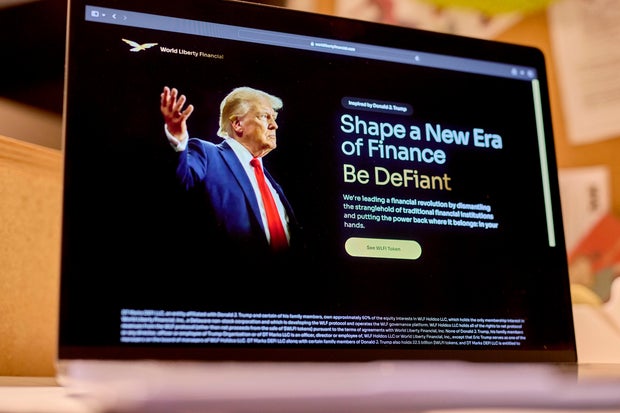The recent surge in the fortunes of President Donald Trump due to his ambitious ventures into the cryptocurrency space has raised both his net worth significantly and many eyebrows concerning potential conflicts of interest. Over the past six months, the Trump family’s wealth has reportedly expanded by billions, primarily influenced by strategic investments and presidential policies leaning favorably towards the digital currency industry.
A detailed report by the watchdog group State Democracy Defenders Action highlights that nearly 40% of President Trump’s personal net worth, which approximates around $2.9 billion, now comprises crypto holdings. These holdings include notable amounts of meme coins like $TRUMP and $MELANIA, launched under Trump’s directive, and substantial stakes in World Liberty Financial, a cryptocurrency exchange closely tied to the Trump family.
World Liberty Financial, having been introduced to the financial sector in October 2024, has quickly positioned itself as a significant player in the cryptocurrency exchange market. The involvement of the Trump family is evident; they hold a majority 60% ownership of the exchange as disclosed on the company’s official website. Moreover, the Trump family also possesses significant quantities of $WLF tokens, securing 75% of net revenues derived from future purchases of these tokens.
Compounding the growth of Trump’s crypto empire, World Liberty Financial recently announced a noteworthy investment from the Abu Dhabi-backed MGX firm. The deal entails MGX investing $2 billion into a stablecoin product managed by World Liberty, earmarked for subsequent reinvestment in Binance, one of the largest and most influential cryptocurrency exchanges globally. While specific details and benefits of this transaction to the Trump family remain undisclosed, the magnitude of the investment has been hailed by World Liberty as a historic precedent for crypto industry investments.
This increased financial lever in the cryptosphere comes as President Trump’s administration has shown an expansive unwinding of federal regulatory frameworks around digital currencies. Since taking office, the Securities and Exchange Commission (SEC) has paused investigations into several crypto-related companies, reflecting a distinct shift in governmental approach since Trump’s inauguration. His administration has issued multiple executive orders aimed at bolstering the digital currency ecosystem in the United States, including promoting international competitiveness and establishing strategic reserves of digital assets.
Despite these potentially prosperous developments, the connections between President Trump’s office, his family’s financial interests, and the regulatory environment governing cryptocurrencies have prompted intense scrutiny and criticism. Critics argue that Trump’s private financial interests are significantly intertwined with his public role, presenting worrisome conflict-of-interest challenges. Virginia Canter, chief counsel for ethics and anticorruption at State Democracy Defenders, criticized the President for not placing his assets into a blind trust, which has been standard practice for previous presidents to avoid any semblance of personal gain stemming from public office.
The situation is further complicated by a lack of transparency concerning investors in Trump-related cryptocurrency ventures. Unlike traditional financial services entities, companies within the cryptocurrency space are not obligated to openly disclose transaction-specific details concerning who buys or sells their financial products. This opacity makes it difficult to delineate between official presidential actions and potential self-serving financial activities involving Trump’s crypto holdings.
This tension has caught the attention of Democratic members from the Senate Banking, Housing and Urban Affairs Committee, who have expressed grave concerns regarding the potential for regulatory manipulations designed to benefit businesses linked directly with Mr. Trump. In their communications with federal financial regulators, these legislators described Trump’s actions as posing “unprecedented risks to our financial system,” owing to conflicts of interests that could undermine the independence of financial oversight institutions.
As the situation develops, both supporters and critics of President Trump are watching closely. On one hand, his moves have been seen as making strides towards turning the U.S. into a “crypto capital of the world,” a promise he had made early in his administration. On the other hand, questions about the ethical implications of his direct and indirect involvement in the crypto industry continue to linger, drawing sustained scrutiny and debate about the intersections of personal business, presidency, and policy-making in America. This narrative will undoubtedly continue to unfold, generating discussions that could influence regulatory frameworks and the financial industry’s trajectory in significant ways.









